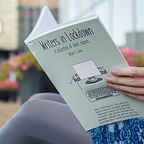Book review: The Martian, by Andy Weir
After finishing this book I feel like my objectivity as a reviewer is being tested. The thing is, a hundred thousand people like this book a lot, it has a 4 star plus average rating and then a film studio invested heavily in a cinema version. It is undeniable that there is peer pressure to go along with the crowd and award it five stars — but is that only because other people treasure it?
My subjective, personal impression (one person’s view) is that this is a 369 page info-dump. It a maths, physics, biology and chemistry guidebook on how to solve problems with good old know-how. The plot is functionally excellent, no problems, but the main character has no emotional or poetic depth, doesn’t muse on his surroundings or apparently have an imagination. What does the boulder field look like to him? A boulder field. So, no analogy, it isn’t ‘like’ anything? No. This is soldier thinking, not a high flight of imagery or style in literary fiction. What is Mars, a body of matter x wide and with x mass, or does it represent something greater in the mind? ‘No, it’s a dumb planet.’ He has no sense of humour, which I would say is the first pre-requisite for survival — and when he does think he’s made an association joke about the dog star, he says ‘if you don’t understand it, fuck you’ (no, I got it thanks, but it wasn’t funny). In short, he doesn’t deserve the rescue attempt.
One thing I picked up on was there are too many ‘said’ words in this story. This word can be replaced, Mary extrapolated. I doubt it, drooled Henry. It’s so true, Sarah contested. Only in some cases, Ben advised/reacted/spat back/insinuated. Said, said, said, said shows an absence of craft.
I read another stuck-alone-on-Mars story called Race the Red Horizon, which came at this scenario from a different perspective; the same tension and propulsion for the chase, the same feeling at the end of relief at having completed a long and tiresome journey, but with more fantasy, more human feeling in it, a greater scope of imagination. I think Weir has tried to write fiction that passes for hard truth reality, from an engineering doctorate perspective where every explanation has to be correct according to Newtonian physics — but the reader learns nothing amazing or original. If that’s the intention, then he’s done admirably in creating a self-help manual to being alone in a hostile environment, showing the benefits of incremental positive progress, the ‘what can I do next from here’ factor. All the information in it might be logical and correct, all the male process thinking, but it isn’t quite entertaining enough for me.
The philosophical conclusion that humans naturally help one another is erroneous, which a biologist should know. The reason we evolved is because we are a selfish and competitive species (I like to think I’m an exception, as I usually work for free). The only reason we give out medals for altruism is because it is so rare and against our programming.
The book was okay, mediumly entertaining ‘uppercase SCIENCE lowercase and smaller font fiction’, but it didn’t appeal to the fascination receptors of my brain. This was a trawl through fact, but I sense a policy to exclude fantasy as that’s embarrassing. What target audience was he writing for, other engineering nerds? I expect it satisfied that group in full because they couldn’t find anything wrong with the science, how many joules of energy are released by sugar etc. Hard science in sci-fi is the preferred dominant skew of authors such as Greg Bear and Arthur C Clarke, but they also used fantasy components or fantastic extrapolations of our empiric physics. This is hard sci-fi but didn’t take the extra step, which is the bit I’m interested in. You can destruct-test the human frame on Earth (please don’t try this).
I know this view is an outlier, without popular support, and no one’s going to click like to this review but, for integrity’s sake, that’s my opinion. I bought Artemis at the same time but have decided not to read it.
On the sole occasion when I did order a piece of flat-pack furniture, no I didn’t read the manual. I’d die on Mars for sure with this attitude, but have a more fulfilling experience down here. Go ahead, roast me, or put a real joke in the comments to show the author how it’s done.
